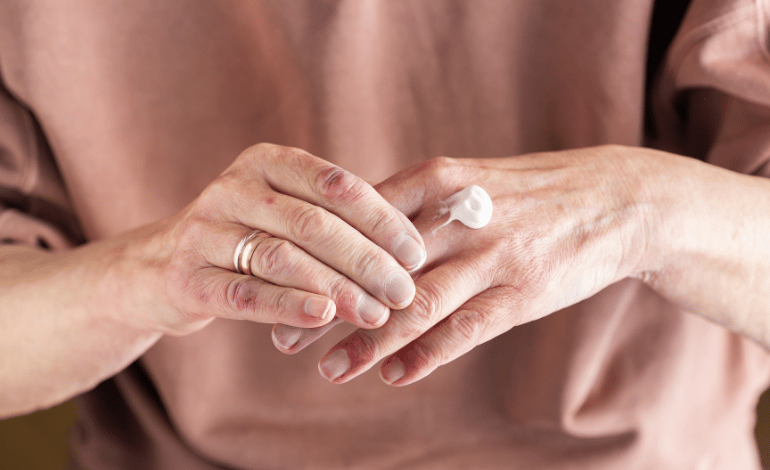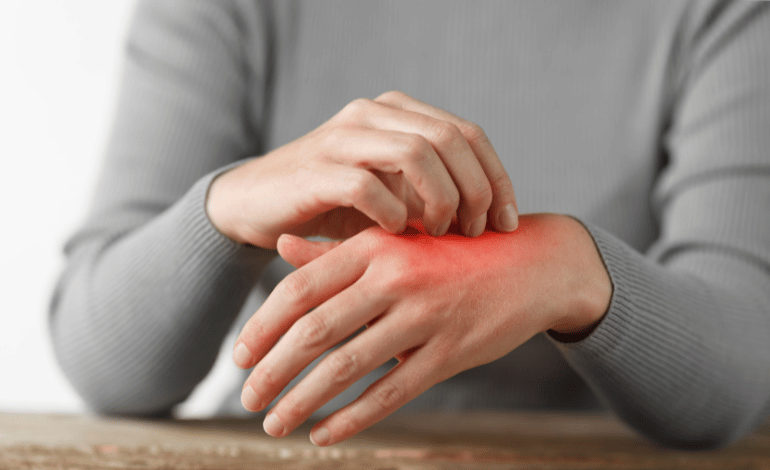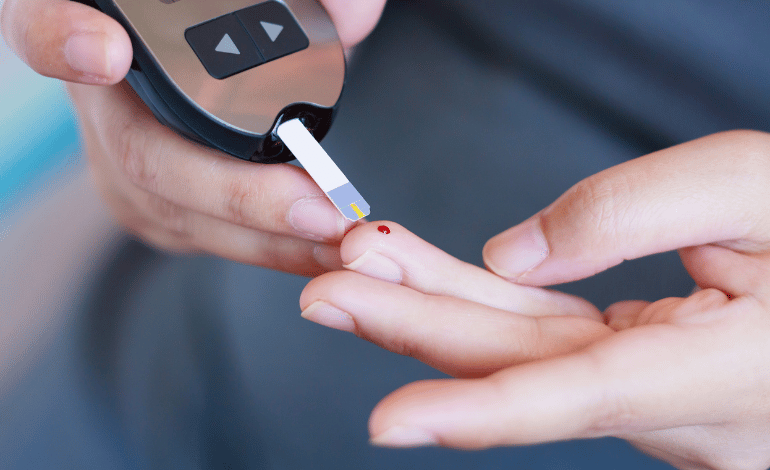Managing Hand Eczema: Tips and Treatments for Healthy Skin

Introduction
Managing Hand Eczema: Tips and Treatments for Healthy Skin: Hand eczema is a common skin condition that affects the hands and fingers. It is characterized by redness, itching, and sometimes blistering or cracking of the skin. The condition can be caused by a variety of factors, including exposure to irritants, allergies, and genetic factors.
Understanding and managing hand eczema is important because it can significantly impact a person’s quality of life. The physical symptoms of the condition can cause discomfort and make it difficult to perform daily activities, while the psychological impact can lead to social isolation and reduced self-esteem. Proper treatment and management strategies can help improve symptoms and reduce the negative effects of hand eczema on daily life.
Causes of Hand Eczema
Hand eczema can be caused by a variety of factors, including irritant contact dermatitis, allergic contact dermatitis, and atopic dermatitis.
Irritant contact dermatitis is the most common cause of hand eczema. It occurs when the skin comes into contact with an irritant substance, such as soap, cleaning products, or chemicals. Repeated exposure to irritants can damage the skin barrier, leading to inflammation and the development of eczema.
Allergic contact dermatitis occurs when the skin comes into contact with a substance to which it is allergic. Common allergens that can cause hand eczema include nickel, latex, fragrances, and preservatives in cosmetics and personal care products.
Atopic dermatitis, also known as eczema, is a chronic skin condition that can affect various parts of the body, including the hands. It is characterized by dry, itchy skin that can become inflamed and irritated.
Other factors that can contribute to hand eczema include genetics, stress, and hormonal changes. People with a family history of eczema or allergies may be more prone to developing hand eczema, while stress and hormonal changes can trigger flare-ups in people with existing eczema.
Symptoms of Hand Eczema
Symptoms of hand eczema can vary depending on the severity of the condition. Common signs and symptoms of the condition include:
- Redness and inflammation of the skin
- Dry, scaly, or thickened skin
- Itching or burning sensation
- Cracked, blistered, or weeping skin.
- Pain or discomfort in the affected area
- Swelling of the hands or fingers
The symptoms of hand eczema can range from mild to severe and can have a significant impact on a person’s quality of life. Mild cases may only cause mild itching or dryness, while severe cases can lead to painful, open sores that make it difficult to perform daily tasks such as washing, cooking, or typing.
In some cases, hand eczema can become chronic, meaning that symptoms persist for months or years. Chronic eczema can cause thickening and discoloration of the skin, as well as fissures or cracks that can become infected.
It is important to seek medical attention if symptoms of hand eczema persist or worsen over time, as proper treatment can help improve symptoms and prevent complications.
Diagnosis of Hand Eczema
Diagnosis of hand eczema typically involves a physical examination by a dermatologist, who can evaluate the appearance and severity of the symptoms. The dermatologist will ask about the patient’s medical history, as well as any history of allergies or eczema in the family.
In some cases, the dermatologist may also perform tests to help confirm the diagnosis or rule out other conditions. These tests may include:
Skin Patch Testing: This test involves applying small amounts of common allergens to the skin to see if they cause a reaction. Patch testing can help identify the specific substances that may be triggering the eczema.
Skin Biopsy: In some cases, a small sample of skin may be taken for examination under a microscope. This can help rule out other skin conditions and confirm the diagnosis of eczema.
It is important to see a dermatologist if symptoms of hand eczema persist or worsen over time, as prompt diagnosis and treatment can help improve symptoms and prevent complications.
Treatment Options for Hand Eczema
There are several treatment options available for hand eczema, including:
Avoiding Triggers: The first step in managing hand eczema is to identify and avoid triggers that can exacerbate symptoms. Common triggers include irritants like soaps, detergents, and solvents, as well as allergens like nickel and latex.
Emollients and Moisturizers: Regular use of emollients and moisturizers can help soothe dry, itchy skin and prevent flare-ups of eczema. These products work by restoring the skin’s natural barrier and trapping moisture in the skin.
Topical Medications: Topical corticosteroids are commonly used to reduce inflammation and relieve itching in cases of mild to moderate eczema. Calcineurin inhibitors are another class of medications that can help reduce inflammation and improve symptoms of eczema.
Oral Medications: In cases of severe or chronic eczema, oral medications like immunosuppressants or antibiotics may be necessary to reduce inflammation and prevent complications.
Other Treatment Options: In some cases, other treatment options like phototherapy or biologic medications may be used to manage symptoms of hand eczema.
It is important to work with a dermatologist to develop a personalized treatment plan based on the severity and underlying cause of the eczema. With proper management and care, most cases of hand eczema can be effectively managed and controlled.
Managing Hand Eczema in Daily Life
Managing hand eczema in daily life involves taking steps to reduce exposure to triggers and protect the skin, as well as implementing self-care practices and maintaining proper hand hygiene. Some tips and strategies for managing hand eczema in daily life include:
Wear Protective Gloves: When performing tasks that involve exposure to irritants or allergens, such as cleaning or handling certain foods, wear protective gloves to reduce skin contact.
Use Mild, Fragrance-Free Products: Use mild, fragrance-free soaps, detergents, and other household products to avoid triggering or exacerbating eczema symptoms.
Moisturize Frequently: Apply moisturizer or emollient cream to the hands regularly throughout the day, particularly after washing or when the skin feels dry or itchy.
Avoid Hot Water: Use lukewarm or cool water when washing hands or performing other tasks to avoid further drying out the skin.
Maintain Good Hand Hygiene: Proper hand hygiene, including regular hand washing and using hand sanitizer, is important for preventing infections that can worsen eczema symptoms.
Identify and Avoid Triggers: Keep track of activities or exposures that tend to trigger eczema symptoms and take steps to avoid them whenever possible.
By incorporating these strategies into daily life, individuals with hand eczema can effectively manage their symptoms and prevent flare-ups. It is also important to work closely with a dermatologist to develop a personalized management plan that addresses individual triggers and concerns.
Impact of Hand Eczema on Quality of Life
Hand eczema can have a significant impact on an individual’s quality of life, affecting them physically, psychologically, and professionally. The physical symptoms of hand eczema, including redness, itching, and scaling, can cause discomfort and pain, and in severe cases, blisters and open sores may develop, making it difficult to perform even basic tasks.
In addition to the physical symptoms, hand eczema can also have a psychological impact. The constant discomfort and visible symptoms of the condition can lead to feelings of embarrassment, anxiety, and depression, as well as social isolation.
The impact of hand eczema can also extend to one’s professional life. In occupations that require frequent hand washing, exposure to irritants or allergens, or use of gloves, such as healthcare workers or food service professionals, hand eczema can significantly impact one’s ability to perform their job effectively. In severe cases, individuals may need to take time off from work to manage their symptoms.
It is important for individuals with hand eczema to seek treatment and manage their symptoms effectively to minimize the impact on their quality of life. This includes working closely with a dermatologist to develop a personalized treatment plan, implementing self-care practices to manage symptoms, and making adjustments to one’s professional and personal life to minimize exposure to triggers. With proper management, individuals with hand eczema can effectively control their symptoms and maintain a good quality of life.
Conclusion
In conclusion, hand eczema is a common condition that can have a significant impact on an individual’s quality of life. It can be caused by irritant contact dermatitis, allergic contact dermatitis, atopic dermatitis, or a combination of these factors, and can present with a variety of symptoms, including redness, itching, and scaling.
Diagnosis and treatment options are available and can be personalized by a dermatologist based on the individual’s specific symptoms and triggers. Additionally, self-care practices and adjustments to one’s personal and professional life can also help to manage symptoms and minimize the impact on daily life.
It is important for individuals experiencing symptoms of hand eczema to seek help and work with their healthcare provider to develop an effective treatment plan. With proper management, individuals with hand eczema can effectively control their symptoms and maintain a good quality of life.








